Best Python Machine Learning Training Institutes in Pune | Hands-On Machine Learning with Python Classes Pune
Discover the best Python Machine Learning training institutes in Pune with expert-led courses, real-world projects, internships, and placement support. Learn AI, deep learning, and data science using Python with top-rated institutes offering both online and offline options.

Table of Contents
- Introduction
- Why Learn Python for Machine Learning?
- Key Criteria for Choosing an Institute
- Top Institutes in Pune
- Course Structure & Curriculum
- Hands‑On Projects & Internships
- Faculty & Mentorship
- Placement & Career Support
- Fees, Duration & Batch Details
- Online vs Offline Training
- Advantages of In‑Class Training
- Who Should Enroll?
- Tips to Maximize Your Learning
- FAQs
- Conclusion
Introduction
Machine Learning (ML) has become a cornerstone of innovation across industries—from healthcare and finance to robotics and smart cities. Pune, a vibrant educational and IT hub in India, is home to several top-tier Python Machine Learning training institutes that equip learners with both foundational knowledge and cutting-edge skills. This article explores the best training options available, details their curriculum, teaching methods, project exposure, placement assistance, and answers frequently asked questions to help you make an informed decision.
Why Learn Python for Machine Learning?
Python has become the de facto language for Machine Learning (ML) and Artificial Intelligence (AI) due to its simplicity, flexibility, and powerful ecosystem. It enables both beginners and professionals to build complex models with fewer lines of code, making the development process faster and more efficient.
Here’s why Python is the top choice for Machine Learning:
-
Rich Libraries & Frameworks:
Python boasts extensive libraries like NumPy, pandas, Scikit-learn, TensorFlow, PyTorch, and Keras—which simplify data preprocessing, modeling, training, and deployment. -
Readable & Concise Syntax:
Python’s easy-to-understand syntax lowers the barrier to entry, helping you focus more on solving ML problems than managing code complexity. -
Massive Community Support:
A global Python developer and data science community ensures continuous updates, open-source contributions, and easy troubleshooting for learners and professionals alike. -
Integration-Friendly:
Python integrates smoothly with other languages (like C, C++, and Java), tools (like Hadoop and Spark), and APIs—allowing robust deployment of ML models into production environments. -
Platform Independent:
Python code runs on Windows, Linux, and macOS, making it ideal for development across platforms and distributed systems. -
Used by Industry Giants:
Tech companies like Google, Facebook, Netflix, and Amazon rely on Python for their ML and AI solutions—making it a valuable skill in the job market.
Whether you're aiming to build data-driven applications, analyze complex datasets, or automate decision-making processes, Python’s power and simplicity make it the most efficient tool for mastering Machine Learning.
Key Criteria for Choosing an Institute
- Curriculum Depth: Look for courses covering data preprocessing, model training, evaluation, optimization, and deployment.
- Project Portfolio: Institutes should include hands‑on projects across domains like CV, NLP, time‑series, and recommender systems.
- Faculty Expertise: Research instructors’ backgrounds, academic credentials, and real-world experience.
- Internship Opportunities: Institutes tied to industry projects or partner companies help you gain real-world exposure.
- Placement Assistance: Resume workshops, interview prep, and corporate tie-ups matter for job seekers.
- Peer Reviews: Alumni testimonials, online reviews, and ratings on platforms like Google, LinkedIn, and Quora matter.
Top Institutes in Pune
Web Asha Technologies
Known for its blended learning model, Webasha combines classroom sessions, live webinars, and cohort-based internship placement. Their ML program culminates in capstone projects in domains like sentiment analysis and predictive analytics.
Course Structure & Curriculum
While specifics vary, a comprehensive curriculum typically includes:
- Python fundamentals and data science essentials: NumPy, pandas, Matplotlib
- Data preprocessing: handling missing values, encoding, scaling
- Statistical modeling reinforcement: regression, classification, clustering
- Advanced ML techniques: ensemble methods, SVM, decision trees
- Deep Learning fundamentals: neural networks, CNNs, RNNs, architecture tuning
- Natural Language Processing (NLP): NLTK, spaCy, tokenize, vectorization
- Computer Vision (CV): OpenCV, image augmentation, object detection
- Deployment techniques: REST API, Docker, Flask, cloud hosting
- Version control: Git & GitHub, MLOps introduction
Hands‑On Projects & Internships
An effective ML course includes multiple real-world projects such as:
- House price or sales forecasting model
- Image classifier using CNNs
- Movie recommendation engine
- Sentiment analysis from tweets or reviews
- Time-series forecasting with ARIMA/LSTM models
- Deployment of ML app via Flask + Docker
Internships—typically spanning 1 to 3 months—allow students to work directly on these projects under mentor guidance.
Faculty & Mentorship
Look for institutes that bring:
- Experienced ML professionals with industry and research backgrounds
- Mentorship in monthly 1:1 review sessions
- Live code reviews and debugging clinics
- Guest lectures from data scientists in Pune’s tech ecosystem
Placement & Career Support
Top institutes provide:
- Placement assistance through partnerships and referrals
- Resume and LinkedIn optimization workshops
- Mock technical and HR interviews
- Job recommendations based on performance
Fees, Duration & Batch Details
- Typical Duration: 4–6 months including internship & projects
- Fees Range: ₹35,000–₹80,000 (depends on curriculum, mentorship, placement)
- Batch Formats: Weekday (morning/evening), weekend, and fast-track options
- Payment Flexibility: EMI, scholarships for academic performers, referral discounts
Online vs Offline Training
| Criteria | Online | Offline |
|---|---|---|
| Flexibility | High | Moderate |
| Campus Experience | Remote | In-Classroom |
| Peer Interaction | Virtual | Direct & Networkable |
| Infrastructure | Self-Provided | Lab Workstations Available |
| Access to Mentors | Scheduled One-on-One | On-Demand Guidance |
Advantages of In‑Class Training
- Immediate doubt resolution
- Group-based problem-solving sessions
- Better peer interaction and networking
- Access to institute's labs & hardware
Who Should Enroll?
Python Machine Learning training programs are designed to benefit a wide spectrum of learners, from absolute beginners to seasoned professionals. Whether you're aiming to switch careers, advance your current role, or simply enhance your skills, these courses are tailored to help you build real-world capabilities.
This training is ideal for:
-
Engineering Students & Graduates:
Especially those from Computer Science, IT, or Electronics who want hands-on experience with AI and ML technologies. -
Working Professionals:
Software engineers, data analysts, system architects, and IT consultants looking to upskill and stay relevant in a rapidly changing tech landscape. -
Career Changers:
Professionals from non-tech backgrounds such as finance, business, or operations aiming to shift into high-demand ML and data science roles. -
Entrepreneurs & Startup Founders:
Innovators seeking to apply machine learning to their products, services, or platforms for better data-driven decisions. -
Data Enthusiasts & Researchers:
Anyone keen to understand predictive analytics, pattern recognition, or how machines can learn from data in various domains. -
Academicians & Teachers:
Professors and lecturers looking to update their curriculum or integrate practical ML knowledge into their teaching methodology.
With flexible learning formats, internship support, and project-based training, any motivated learner with a basic understanding of Python or programming logic can enroll and succeed.
Tips to Maximize Your Learning
- Start early on project work and Git contributions
- Participate in Kaggle competitions and online hackathons
- Attend workshops and guest speaker sessions
- Stay updated with research papers, podcasts, and blogs
- Form study groups and code together
FAQs
1. What prerequisites are needed for ML training?
Basic programming familiarity (preferably Python) and understanding of statistics are helpful.
2. Do I need to know Linear Algebra?
Yes—topics like matrices, vectors, and calculus are foundational and covered during course.
3. Are there internships included?
Yes—most institutes offer 1–3 month internships with live ML projects.
4. Do courses cover deep learning frameworks?
Absolutely. Core DL libraries like TensorFlow and PyTorch are part of advanced modules.
5. Is placement support available?
Yes—resume prep, mock interviews, and corporate partner referrals are common.
6. Can non-CS students enroll?
Yes. Institutes typically provide foundational modules to help non-CS learners catch up.
7. How soon can I start applying for jobs?
After project completion and interview prep—usually within 4–6 months.
8. Are there weekend batches?
Yes—options include weekends or weekday evenings to suit working professionals.
9. Do I need a laptop?
Yes, for both online and offline training—offline institutes do provide lab access.
10. Can I access recorded lectures?
Many institutes provide recordings for revision and missed sessions.
11. Will I work on capstone projects?
Yes—typical capstones include image classification, NLP pipelines, deployment apps.
12. Is there a certification exam?
Yes—certificate and grading tests are provided upon successful course completion.
13. Do I learn deployment skills?
Absolutely—REST API, Docker, Flask, and cloud hosting are commonly included.
14. Are EMI options available?
Yes—many institutes offer installment plans and early-bird discounts.
15. What is average batch size?
Usually 15–25 students to ensure personal attention from instructors.
16. Will I get one‑on‑one mentoring?
Yes—bi-weekly mentoring sessions and code review clinics are standard.
17. Are the courses update-to-date?
Top institutes update regularly to include latest algorithms and tools.
18. Can I take both online and offline sessions?
Some institutes offer hybrid formats—attend some classes online and others in-person.
19. How do I assess which institute is best?
Evaluate curriculum, faculty, alumni feedback, project depth, and placement stats.
20. Do they assist with real company projects?
Many institutes collaborate with startups or corporates to provide real-world internship projects.
Conclusion
In Pune’s dynamic tech landscape, the right Python Machine Learning institute can accelerate your career by offering a structured curriculum, expert faculty, real-world projects, and valuable internship exposure. Choose based on your learning goals, timing, and budget. Whether you aim to join a Faang-level research team or launch your own AI startup, hands-on training paired with placement support provides the edge you need.
What's Your Reaction?
 Like
0
Like
0
 Dislike
0
Dislike
0
 Love
0
Love
0
 Funny
0
Funny
0
 Angry
0
Angry
0
 Sad
0
Sad
0
 Wow
0
Wow
0















